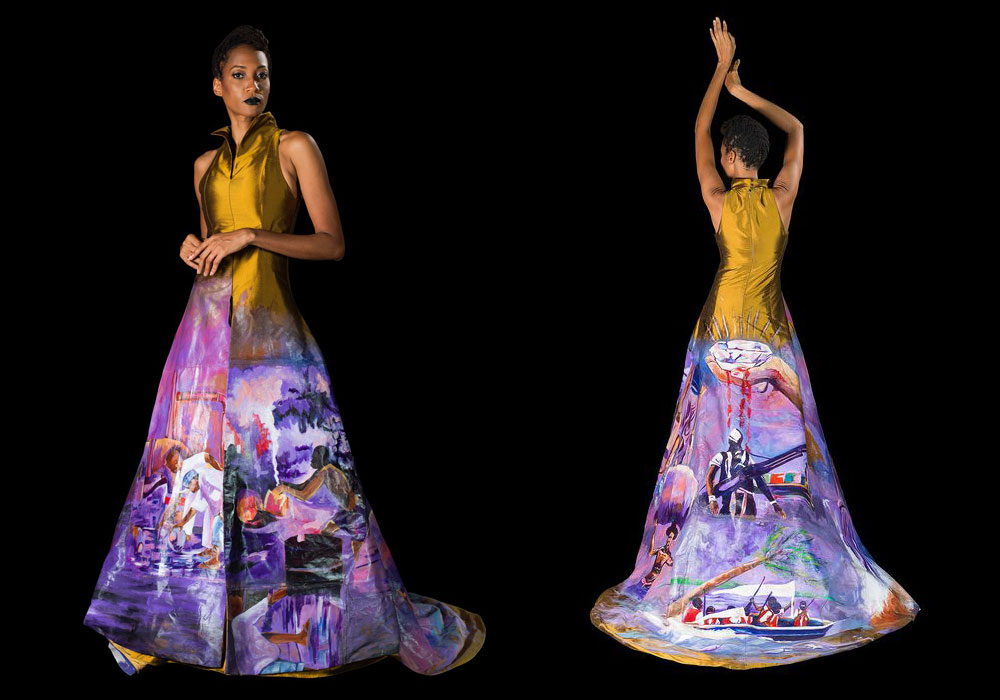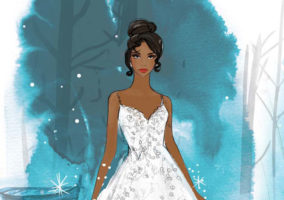
Darlings, before we leave your hearts for the long holiday weekend, here’s a smattering of the CULTCHA for you, courtesy of our exquisite taste. You’re quite welcome. Have a happy and safe holiday, American kittens!
The dress communicates in long, emotional paragraphs a story that its designer Patience Torlowei, who was born in Enugu, Nigeria, knows intimately. Growing up so close to the country’s oil-producing region, she saw the havoc that the drilling and the subsequent spills of poisonous crude have had on the surrounding environment.
‘The dress comes out of pain’: Patience Torlowei creates fashion from the highs and lows of modern Africa by Robin Givhan at The Washington Post
The designer, who died earlier this week, told the story of American fashion and the American Dream in a single ensemble.
Isabel Toledo’s inauguration wardrobe for Michelle Obama exuded the optimism of a historic moment by Robin Givhan at The Washington Post
A symbol of both flight and fancy, plumes have been the object of obsession — and adornment — for centuries.
The Transformative, Talismanic Power of Feathers by Ligaya Mishan at The New York Times Style Magazine
“I talked to a lot of Lithuanians who had lived under Russian oppression, and that really helped a lot in giving me insight into what they were thinking at the time,” says Emmy nominee Odile Dicks-Mireaux, who recreated looks of 1980s Ukraine in ‘Chernobyl.’
‘Chernobyl’ Costume Designer on Using YouTube to Create BioRobots, Finding Beauty in the Ugly by Nadia Neophytou at The Hollywood Reporter
“The world will kick you down and tell you you’re worthless. It’s your job to have the strength to stand up and push on, to keep fighting.”
Teddy Quinlivan Is Chanel Beauty’s First Openly Transgender Model by Raleigh Fasanella at Allure
Polari is about drama and Polari speakers were drama queens par excellence. Another feminine stereotype—gossip—is meat and drink to Polari. Polari was essentially a social language, and many speakers lived in densely packed urban areas and had numerous friends, acquaintances, lovers, one-night-stands, exes, crushes, stalkers, rivals, enemies and frenemies. They also had a perfect recollection not only of all of their current relationships but of the status of the relationships of all of the other people that they knew, and social occasions would be spent updating one another on these relationships
The Feints and Jabs of Polari, Britain’s Gay Slang by Paul Baker at LitHub
It’s embarrassing that I have to be told this. That as a grown adult I have to be told that everyone is human first. Minorities don’t have to be told this. Those whom white culture labels as “other” question their worldview naturally because the dominant culture has always forced them to, while failing to do so itself. “The point of seeing the racing of whites is to dislodge them/us from the position of power, with all the inequities, oppression, privileges and sufferings in its train,” wrote Dyer, “dislodging them/us by undercutting the authority with which they/we speak and act in and on the world.” That’s the critical shift — to acknowledge that your perspective, as Wallace put it, isn’t “the most logical, reasonable way.” It involves not just seeing your own race, but understanding that race alone doesn’t define everyone else. Of course, no one wants to be aware of their race all the time — just ask any person of color — but isn’t it the least we can do?
White Looks by Soraya Roberts at LongReads
I’m going to finish it, I swear, and probably very soon. DuVernay is a major filmmaker (and I was impressed with her OWN drama, Queen Sugar), and her artistry was clear even in the brief amount I watched. (I made it until Felicity Huffman’s prosecutor Linda Fairstein began laying out all the bogus reasons the rape investigation should focus on all these young black men who were “wilding” in the park at night.) But there was something so oppressive about watching this very real miscarriage of justice play out in scripted form that I couldn’t face it that day, or in any of the days that have followed.
Surviving the Year of Difficult TV by Alan Sepinwall at Rolling Stone
Nostalgia is a funny thing. Sometimes, when we glance backward through our rose-colored glasses, images can blur. There is, for example, a fair amount of longing these days for the bygone charms of the video store, that special brick-and-mortar space we used to wander in pre-Internet days, despairing for VHSs out of stock before plunking down a few bucks for what was left. It was the possibility of discovery, be it instigated by one’s own interests or at the prompting of a knowledgeable clerk, that gave the retail space its particular magic. Bring up the video store to any film lover of a certain age, and they’ll likely tell you a story of how they found the Movie That Changed Their Life at such an establishment, often entirely by accident.
Guys, Blockbuster Wasn’t That Great by Jason Bailey at Vulture
[Photo Credit: Courtesy of Patience Torlowei]
Friday Leftovers for the Week of August 25th, 2019 Next Post:
Venice Film Festival: Timothée Chalamet Beams Down for “The King” Photo Call and Premiere
Please review our Community Guidelines before posting a comment. Thank you!



